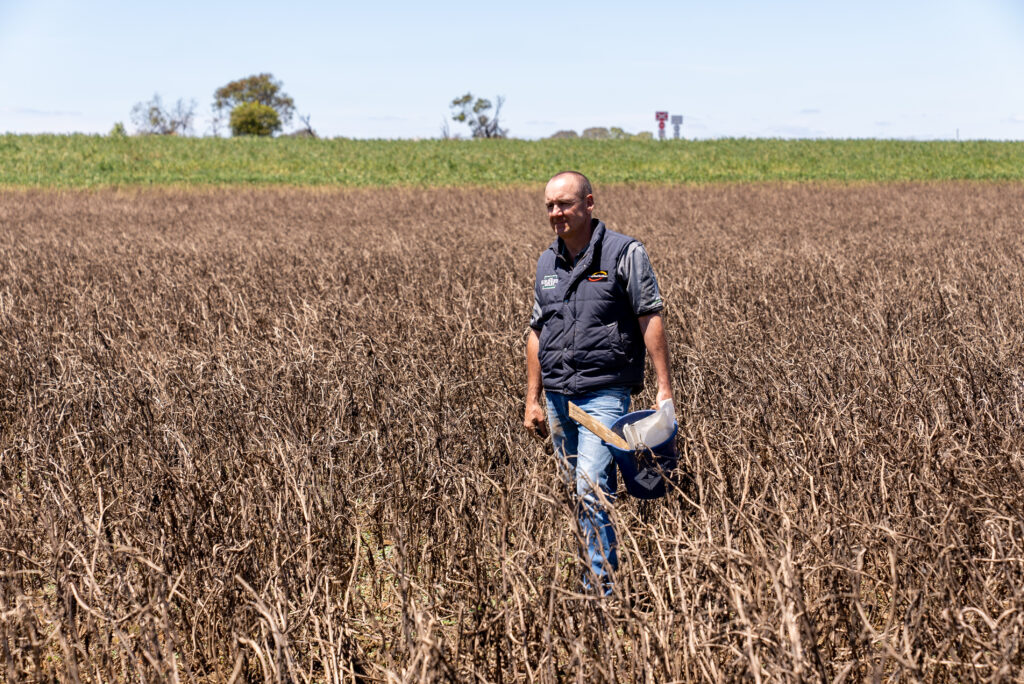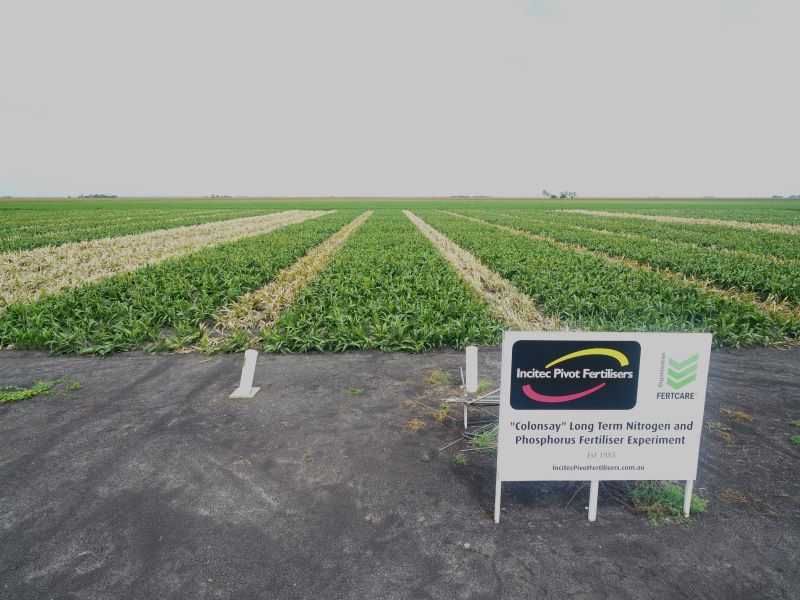Agronomic Insights

Bede O’Mara – IPF Technical Agronomist
The challenge of producing the same or higher yielding summer cereals and cotton crops with a smaller environmental footprint is front of mind for many growers.
Enhanced efficiency fertilisers (EEFs) like eNpower® can help address this challenge by using proven technology to maximise yield potential while lowering nitrogen rates and reducing greenhouse gas (GHG) emissions.
By achieving equivalent or higher yields with lower nitrogen rates and reduced GHG emissions, growers can produce the same with less and demonstrate they are doing their bit for the environment.
EEFs are a unique proposition in that they can protect the nitrogen investment made by a grower and improve crop performance while keeping excess nitrogen out of the environment.
EEFs help limit nitrogen losses, enabling crops to use applied nitrogen more efficiently.
Recent research indicates there is substantial scope to improve fertiliser nitrogen use efficiency (fNUE) and reduce N losses (nitrous oxide (N20) and di-nitrogen (N2)) in cotton without any impact on lint yield, by adjusting N fertiliser application rates in combination with the use of the nitrification inhibitor DMPP, such as eNpower® (Scheer et al, 2022).
EEFs reduce denitrification by keeping nitrogen in its stable ammonium form for longer, delaying potential losses from nitrate nitrogen as nitrous oxide emissions by up to 60%. This reduction in N losses in turn enables a potential reduction in N fertiliser rates, as crops are better able to use whatever N is applied.
EEFs are easily incorporated in existing fertiliser programs, as a spray on inhibitor application for N based fertilisers using eNpower on IPF products including Urea, MAP, DAP, as well as GranAm® and NPKS Compound.
Recent irrigated cotton studies demonstrate the reduction in pre-plant N rates in conjunction with nitrification inhibitors can greatly assist in the reduction of GHG (N20) emissions from pre-plant fertiliser N for months by a range of 77-86 % across key Queensland and NSW cotton growing regions (Schwenke et al 2018).
Relative yield results from Incitec Pivot Fertilisers N rate nitrification inhibitor (trademark eNpower-active ingredient DMP) replicated trials conducted across cotton regions in NSW, Qld and NT 2020-21 & 2021-22 growing season are presented below (Figure 1).
At each site, the lint yield of the grower’s standard rate was used as a reference yield of 100%. The yield of other treatments, N rate and eNpower were calculated as a percentage of the grower standard yield to allow comparison across sites.

The N source was BIG N® anhydrous ammonia (82-0-0) applied 2-4 months preplant using host farmer equipment.
When the effect of applying eNpower on lint yield was analysed, it showed there was a significant increase (p<0.05) increase in lint yield compared to the Big N alone treatments where no nitrification inhibitor was applied. The largest responses to eNpower were at lower N rates.
Similar results were found in a recently harvested Incitec Pivot Fertilisers eNpower trial in maize, shown in Figure 2.

The N source used was BIG N® anhydrous ammonia (82-0-0) applied in mid-June 2022 using host farmer equipment.
The application of eNpower maximised grain yield at the second lowest N rate, 300 kg/ha N. The corresponding grain yield when the nitrification inhibitor was not applied at 300 kg/ha N was significantly lower (p<0.1). Increasing N rates about 300 kg/ha of N did not increase grain yield when eNpower was applied. However, when eNpower was not applied, an extra 50 kg/ha N was required to produce a similar yield result.
eNpower has shown significant yield improvements in irrigated cotton and maize in nitrogen responsive environments and can add other positive benefit of reducing GHG emissions, even where high rates of N have been applied or when native soil mineral nitrogen levels are high.
eNpower® can boost crop yields, potentially allowing the reduction in nitrogen rates to maintain equivalent production and reduce greenhouse gas emissions.
Trials conducted in dryland sorghum and maize systems have reported lower denitrification losses. However, even though episodic in frequency in dryland systems, under anaerobic conditions and warm soil conditions, nitrogen losses can still be significant.
Ongoing IPF research continues to reveal the best use patterns for EEFs like eNpower and dual inhibitors. Glasshouse and field condition experiments to determine longevity of efficacy under different environmental conditions continue to be explored.
Growers are encouraged to start trialling EEFs themselves to establish the benefits to their operations.
“Using EEFs in conjunction with site-specific, prudent crop nutrition programs is likely to show overall farm business benefits in ESG reporting in the near future,” Mr O’Mara said.
Further Information
For further information, please feel free to contact:
Bede O’Mara on 0417 896 377 bede.omara@incitecpivot.com.au
David McRae on 0477 987 321 david.mcrae@incitecpivot.com.au
Jim Laycock on 0427 006 047 jim.laycock@incitecpivot.com.au
References
Scheer, C., David W. Rowlings, D.W, Antille, D.L., Migliorati, M.D.,·Fuchs, K. and Grace, P.R. (2022) Improving nitrogen use efficiency in irrigated cotton production. Nutr Cycl Agroecosyst https://doi.org/10.1007/s10705-022-10204-6
Schwenke, G, and McPherson, A. (2018) Mitigation of nitrous oxide emissions from furrow-irrigated Vertosols by 3,4-dimethyl pyrazole tetra-methylene sulfone, an alternative nitrification inhibitor to nitrapyrin for direct injection with anhydrous ammonia. Soil Research, 2018, 56, 752–763 https://doi.org/10.1071/SR18114
Resources
DOWNLOAD INSIGHTDISCLAIMER
This is a guide only, which we hope you find useful as a general tool. While IPF has taken all reasonable care in the preparation of this guide, it should not be relied on as a substitute for tailored professional advice and IPF accepts no liability in connection with this guide. Incitec Pivot Fertilisers manufactures and sources fertilisers from other suppliers. The fertiliser supply chain extends beyond the company’s direct control, both overseas and within Australia. Incitec Pivot Fertilisers hereby expressly disclaims liability to any person, property or thing in respect of any of the consequences of anything done or omitted to be done by any person in reliance, whether wholly or in part, upon the whole or any part of the contents of this article.
You might also be interested in these

Horticulture, Pasture, Sugar, Summer Crop, Winter Crop
Spot on soil sampling
February / 2024

Summer Crop
Avoid maize yield loss from N banded near the seed
October / 2024

Pasture, Summer Crop
Taking Stock After the Floods
March / 2023

Summer Crop
Summer crop 23-24: Nutrient strategies and lessons from last season
August / 2023

